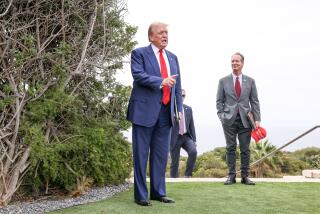State GOP to Hold Early Presidential Straw Poll : Politics: The intent is to give California more clout in 1996 primary season. But the timing of the event will put candidates on the spot.
- Share via
California Republicans will plunge into the already turbulent sea of presidential caucuses and primaries early next year, holding a vote-by-mail straw poll of hundreds of thousands of GOP members whose winner will be announced the weekend before the Iowa caucuses.
The intent of the straw poll is to generate enthusiasm--and money--among Republicans here, with each vote requiring purchase of a $25 party membership. But the move is also an effort to put California back on the 1996 political map.
As party leaders here see it, the poll could draw attention to some lucky candidate just days before the traditional start of the political season. The unspoken fear is that the primary season may be over before California’s “early” primary on March 26.
“This is an opportunity for someone to get a bump out of California going into Iowa,” said GOP chairman John Herrington. “I don’t care who you are, you can’t ignore California.”
The hitch for the candidates? Party leaders may demand that candidates show up for their Feb. 9-11 convention in order to qualify for the poll. And that would require candidates to drop everything the crucial weekend before the Iowa caucuses, fly halfway across the country to California, and fly back to Des Moines before voting commences there on Feb. 12.
The plans place the Republican presidential candidates in a difficult position of either offending the traditional first-in-the-nation states of Iowa and New Hampshire or alienating GOP activists in the biggest electoral state, California.
It comes amid other assaults on the two key states, where yelps of dismay have arisen from activists grown accustomed to the bright spotlight they engender every four years--and seldom in between.
Louisiana hopes to hold a state caucus six days before Iowa--which has prompted the Midwesterners to order candidates to stay out of the Bayou State or else. Delaware moved up its primary to Feb. 24, four days after New Hampshire, angering officials there who had demanded a weeklong window between it and every other primary.
The sensitivity of the matter was evident in the carefully worded response from the headquarters of Republican front-runner Bob Dole.
“This campaign has not yet received a formal proposal from the California state party on this potential vote and hasn’t made any decisions about February scheduling yet,” said Dole spokesman Nelson Warfield.
“We’re very cautious not to become involved in any activity that undermines the traditionally respected role of Iowa and New Hampshire in the political nomination process.”
A spokesman for Texas Sen. Phil Gramm, who has angered both Iowa and New Hampshire with his declared intentions to compete in Louisiana and Delaware, said that his campaign has not yet been brought up to speed on the plans of California Republicans.
“We suspect that we would do very well,” said Howard Opinsky. The Gramm campaign has spent months organizing in California and has grabbed some high-profile endorsements, although the state’s two biggest Republican names, Gov. Pete Wilson and Atty. Gen. Dan Lungren, have endorsed Dole.
Speaking not for attribution, however, several campaign officials predicted that the California effort is doomed to failure.
“There’s not a prayer we’ll become involved, particularly when the focus of virtually every campaign will be on winning the two states under the media spotlights,” said one campaign official. “It would become a sideshow.”
Said another, dismissively: “This may turn out to be California’s CityVote.” The official referred to a plan for early caucuses among urban voters that all but collapsed when many candidates refused to play along.
*
State party chairman Herrington said that some details of the straw poll remain under discussion. At this point, he said, party leaders plan to mail poll ballots before Jan. 15 to a “wide group” of GOP voters, but not all of the nearly 5.5 million registered Republicans. That, he said, would be too costly. Ultimately, the ballots will probably be sent to hundreds of thousands of voters, including those on mailing lists compiled by candidates.
“Any Republican who wants a ballot is going to get one,” he said.
Besides its timing, the major drawback of any straw poll here is that it is not binding. Votes for delegates will remain tied to the results of the winner-take-all March 26 primary. And it remains questionable whether any of the campaigns--even the well-financed ones--will want to spend crucial dollars on what amounts to a beauty contest.
Going strictly by the numbers, however, even California’s informal effort would dwarf the official goings-on in Iowa and New Hampshire.
In 1988, about 120,000 Iowans took part in that state’s Democratic caucuses. The number fell to 25,000 in 1992, since most of the candidates ceded Iowa to home-state Sen. Tom Harkin.
In 1988, the last time there were multi-candidate races for both parties in the New Hampshire primary, 153,484 Republicans cast ballots and 116,341 Democrats did so.
Herrington said that he hopes the effort will invigorate California Republicans, who have thus far been distanced from the hurly-burly of campaigning in the early states.
“Jan. 1 is when the big effort starts on the presidential drill and anything that the Republican Party can do to raise the consciousness of Republican voters, to raise the enthusiasm level of party workers, certainly needs to be done,” he said.
The poll costs $25 a person because that is the party’s membership fee, Herrington said. Whatever money is collected will go toward the estimated $13 million that the state GOP plans to spend on vote-getting efforts leading up to the 1996 general election, he said.
More to Read
Get the L.A. Times Politics newsletter
Deeply reported insights into legislation, politics and policy from Sacramento, Washington and beyond. In your inbox twice per week.
You may occasionally receive promotional content from the Los Angeles Times.











